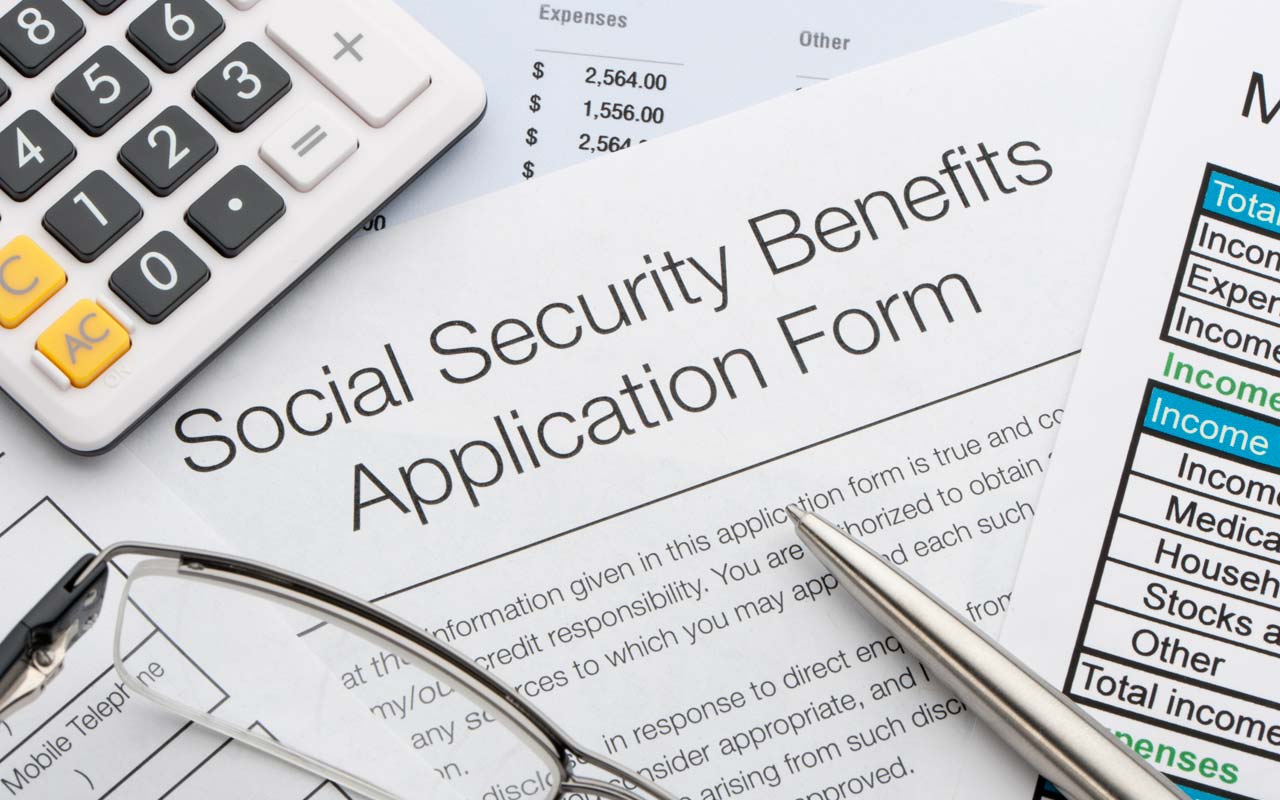6 Reasons Your Social Security Benefits May Be Smaller Than You Expect
You follow the rules as best you can and figure you’ll get what you’re entitled to when you finally claim Social Security.


Profit and prosper with the best of Kiplinger's advice on investing, taxes, retirement, personal finance and much more. Delivered daily. Enter your email in the box and click Sign Me Up.
You are now subscribed
Your newsletter sign-up was successful
Want to add more newsletters?

Delivered daily
Kiplinger Today
Profit and prosper with the best of Kiplinger's advice on investing, taxes, retirement, personal finance and much more delivered daily. Smart money moves start here.

Sent five days a week
Kiplinger A Step Ahead
Get practical help to make better financial decisions in your everyday life, from spending to savings on top deals.

Delivered daily
Kiplinger Closing Bell
Get today's biggest financial and investing headlines delivered to your inbox every day the U.S. stock market is open.

Sent twice a week
Kiplinger Adviser Intel
Financial pros across the country share best practices and fresh tactics to preserve and grow your wealth.

Delivered weekly
Kiplinger Tax Tips
Trim your federal and state tax bills with practical tax-planning and tax-cutting strategies.

Sent twice a week
Kiplinger Retirement Tips
Your twice-a-week guide to planning and enjoying a financially secure and richly rewarding retirement

Sent bimonthly.
Kiplinger Adviser Angle
Insights for advisers, wealth managers and other financial professionals.

Sent twice a week
Kiplinger Investing Weekly
Your twice-a-week roundup of promising stocks, funds, companies and industries you should consider, ones you should avoid, and why.

Sent weekly for six weeks
Kiplinger Invest for Retirement
Your step-by-step six-part series on how to invest for retirement, from devising a successful strategy to exactly which investments to choose.
You follow the rules as best you can and figure you’ll get what you’re entitled to when you finally claim Social Security. But with this program, timing is everything. At best, you’ll have to wait at least a month after you file to get any benefit, and you may have to wait almost a year to get the full monthly amount. At worst, you could lose thousands of dollars in foregone benefits, even if the mistake is a timing error on Social Security’s part.
Here are six reasons your Social Security benefits may not live up to your expectations—and how to claim the highest benefits possible.
It is with a heavy heart that we report that the author of this slide show, Jane Bennett Clark, died in March 2017 of injuries suffered in a tragic accident. Jane was one of the finest reporters and writers ever to work for Kiplinger’s Personal Finance magazine.

The Check Isn’t in the Mail -- Yet
- Your expectation: You’re going to throw yourself a big birthday party with your first Social Security check.
- The reality: Don’t hold your breath to blow out the candles. Social Security pays the first benefit the month after you file (and the government doesn’t send paper checks anymore).
If you were born in November, for instance, you’d generally get your first benefit, via electronic deposit, in December. If you claim Social Security as soon as you turn 62, however, you must be 62 for the entire month to be considered eligible. Thus, if you turn 62 on November 15, you’re first considered eligible in December and won’t collect your first benefit until January.
An exception to the exception: Social Security, in its wisdom, considers you to be a year older the day before you actually celebrate your birthday. If you turn 62 on November 2, your eligibility date is November 1, making you eligible for the entire month. Likewise, if you turn 62 on November 1, the eligibility date is October 31. In both cases, because you would be 62 for the full month of November, your first benefit would arrive in December.
If you were born on the first through the 10th of the month, your first check will be deposited to your account on the second Wednesday in December; if your birthday falls on the 11th through the 20th, the check goes into your account on the third Wednesday; for people born on the 21st through the 30th or 31st, the payday is the fourth Wednesday. (A couple more exceptions: If your benefit is based on the work record of a spouse, his or her birthday—not your own—controls when you’ll be paid, and if you were receiving benefits prior to May 1997, you'll get your payment on the third of the month.)

Extra Credits Take Extra Time to Appear
- Your expectation: You filed for Social Security benefits at age 68, rather than your full retirement age of 66, knowing you’ll get an 8% boost in benefits for every year you wait after full retirement age, until age 70.The reality: When you receive your first payment, it won’t reflect the 16% bump-up.
If you delay taking Social Security after your full retirement age (66 if you were born between 1943 and 1954) but file for benefits before reaching age 70, you may have to wait almost a year after filing before some of that extra money kicks in. That’s because the delayed credits for the year in which you file aren’t added to your benefit until January of the following year.
Say you turned 66 in June 2015 and file for benefits in June 2017. Your first Social Security benefit should reflect your delayed credits for July 2015 through December 2015, plus all of 2016. But you’ll have to wait until January 2018 to get the credits for January through June 2017. Starting in January 2018, your benefit will include the full 16% bump.

Restrictions on a Restricted Application
- Your expectation: You want to take advantage of a provision that lets you file a restricted application to claim benefits based on your spouse’s record, so you can collect some cash while your own benefit grows at 8% a year between age 66 and age 70. You file your claim several months in advance of your full retirement age to be sure it goes through on time.
- The reality: Only workers who reached age 62 on or before January 1, 2016, can use the restricted application strategy, and it’s open to them only when they reach full retirement age (which is 66 for those born from 1943 through 1954).
Unless you specify on your application the date you want your claim to be processed, Social Security might jump the gun, precluding your ability to file a restricted application and giving you your own benefit instead of the spousal benefit.

Payment for the Month a Beneficiary Dies
- Your expectation: Your spouse, who died on March 30, received his final Social Security benefit as an electronic deposit to your joint bank account on April 3. You’ll get to keep the deposit.
- The reality: Uncle Sam wants his money back. The rules say a beneficiary must live for the entire month to qualify for a benefit for that month (it’s not prorated by the date of death).
You or the funeral director who handled your spouse’s funeral should have notified Social Security of the death to stop future payments. Contact the bank and ask that the money be returned to Social Security.

The Retroactive Trap
- Your expectation: You’ve delayed taking your benefits to get the biggest benefits payout possible, and you are finally ready to file for Social Security. You make your claim and are offered six months’ worth of retroactive benefits as part of the deal, which you take. What a nice bonus for your patience in waiting to file!
- The reality: Your monthly benefits will be lower than you expected.
Social Security is required to offer the lump-sum back pay to anyone applying after full retirement age. But there’s a catch: If you take the lump sum, the clock for claiming gets turned back by six months, reducing your delayed retirement credits and resulting in lower benefits for the rest of your life. If you’ve racked up 48 months’ worth of credits, your benefit will be 32% higher than if you had claimed at age 66. But if you take the lump sum, you’ll have just 42 months’ worth of credits and just a 28% hike over your age 66 benefit. Rather than take the money, hold out for the higher benefit, which will likely result in more lifetime income.

It’s Your Ex’s Fault
- Your expectation: You and your spouse tried to work things out, but after nine-and-a-half years, the marriage is over. Your divorce came through the day before your tenth anniversary. At least you’ll be able to qualify for half of your ex’s Social Security benefit, which is more than your own accrued benefit.
- The reality: Your timing couldn’t have been worse.
Divorced spouses who have not remarried can qualify for up to half of the other’s Social Security benefit; they can also qualify for a survivor benefit based on the other spouse’s record (the survivor gets a benefit equal to what the other was getting when he or she died). In both cases, however, the couple has to have been married for a full 10 years to qualify.
Profit and prosper with the best of Kiplinger's advice on investing, taxes, retirement, personal finance and much more. Delivered daily. Enter your email in the box and click Sign Me Up.

-
 Dow Leads in Mixed Session on Amgen Earnings: Stock Market Today
Dow Leads in Mixed Session on Amgen Earnings: Stock Market TodayThe rest of Wall Street struggled as Advanced Micro Devices earnings caused a chip-stock sell-off.
-
 How to Watch the 2026 Winter Olympics Without Overpaying
How to Watch the 2026 Winter Olympics Without OverpayingHere’s how to stream the 2026 Winter Olympics live, including low-cost viewing options, Peacock access and ways to catch your favorite athletes and events from anywhere.
-
 Here’s How to Stream the Super Bowl for Less
Here’s How to Stream the Super Bowl for LessWe'll show you the least expensive ways to stream football's biggest event.
-
 States That Tax Social Security Benefits in 2026
States That Tax Social Security Benefits in 2026Retirement Tax Not all retirees who live in states that tax Social Security benefits have to pay state income taxes. Will your benefits be taxed?
-
 What to Do With Your Tax Refund: 6 Ways to Bring Growth
What to Do With Your Tax Refund: 6 Ways to Bring GrowthUse your 2024 tax refund to boost short-term or long-term financial goals by putting it in one of these six places.
-
 What Does Medicare Not Cover? Eight Things You Should Know
What Does Medicare Not Cover? Eight Things You Should KnowMedicare Part A and Part B leave gaps in your healthcare coverage. But Medicare Advantage has problems, too.
-
 12 Great Places to Retire in the Midwest
12 Great Places to Retire in the MidwestPlaces to live Here are our retirement picks in the 12 midwestern states.
-
 15 Cheapest Small Towns to Live In
15 Cheapest Small Towns to Live InThe cheapest small towns might not be for everyone, but their charms can make them the best places to live for plenty of folks.
-
 15 Reasons You'll Regret an RV in Retirement
15 Reasons You'll Regret an RV in RetirementMaking Your Money Last Here's why you might regret an RV in retirement. RV-savvy retirees talk about the downsides of spending retirement in a motorhome, travel trailer, fifth wheel, or other recreational vehicle.
-
 The 24 Cheapest Places To Retire in the US
The 24 Cheapest Places To Retire in the USWhen you're trying to balance a fixed income with an enjoyable retirement, the cost of living is a crucial factor to consider. Is your city the best?
-
 The Six Best Places to Retire in New England
The Six Best Places to Retire in New Englandplaces to live Thinking about a move to New England for retirement? Here are the best places to land for quality of life, affordability and other criteria.
